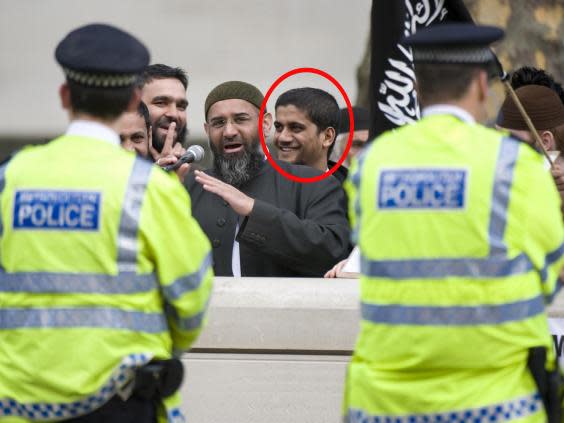UK’s ‘most dangerous extremist group’ regenerating after terrorist prisoners released
Britain’s “most prolific and dangerous extremist group” is regenerating following the release of several convicted terrorists from prison, it has been suggested.
Supporters of Anjem Choudary’s al-Muhajiroun group carried out atrocities including the London Bridge attack, 7/7 London bombings and murder of Lee Rigby, and many have fought for Isis, al-Qaeda and the Taliban abroad.
Choudary is among several activists released from prison in the past six months, as well as men who canvassed support for Isis on Oxford Street and members of a terror cell that plotted to bomb the London Stock Exchange in 2010.
The head of national counterterror policing said officers were working to disrupt terrorist activity by al-Muhajiroun, which has shown itself to be adept at surviving past crackdowns.
The warning comes as debate rages over the potential danger posed by teenage “jihadi bride” Shamima Begum and other Isis members who want to return to the UK.
A report by counterextremist group Hope Not Hate said al-Muhajiroun was “stirring back into life” after two years of relative silence while key members were in prison.
Chief executive Nick Lowles told The Independent: “The release of some of their more prominent activists, albeit on strict controls, appears to be galvanising some younger supporters into re-establishing street stalls and other public activities.
“While a mere shadow of its former self, al-Muhajiroun still has the potential to cause havoc.”
The group’s annual State of Hate report said supporters have recently been seen at street preaching stalls in east London, made appearances at Speakers Corner in Hyde Park and started new social media accounts.
Ricardo McFarlane, who was filmed alongside London Bridge ringleader Khuram Butt, future Isis executioner Siddhartha Dhar and other al-Muhajiroun members in 2015, was seen by The Independent debating Islam with Tommy Robinson supporters outside the Old Bailey in September.
Hope Not Hate says al-Muhajiroun units are currently active in parts of London, Luton and Derby, with smaller numbers of supporters in Birmingham, Leicester and Slough.
Metropolitan Police assistant commissioner Neil Basu, the head of UK counterterror policing, said members would not be allowed to incite terrorism, or exploit social problems and tensions.

“We are working closely with police forces across the UK to help officers identify and disrupt al-Muhajiroun activity, so we can deprive them of any opportunity to recruit new members or function effectively as a group,” he told The Independent.
“Alongside our partners in policing, government and the security services, we will work determinedly to prevent them from regrouping, or having any opportunity to disseminate their beliefs of intolerance, hatred and violence to the public.”
Mr Lowles called al-Muhajiroun “Britain’s most prolific and dangerous extremist group” and warned that while Choudary and co-defendant Mizanur Rahman are under tight licence conditions, their release could inspire other fanatics.
Some members have served multiple prison sentences for extremist activities, being freed only to reconnect with fellow Islamists and be prosecuted again.
There are concerns about the effectiveness of deradicalisation efforts in prison, and authorities' capacity to monitor the rising number of terror convicts being freed.
Dr Michael Kenney, a University of Pittsburgh professor who spent time embedded with al-Muhajiroun, confirmed that some members were “remobilising to continue their activism” on the streets and online.
“Al-Muhajiroun has bounced back from previous government crackdowns,” he added. “Over the years, numerous leading and veteran activists have reengaged once they completed their prison sentences and parole conditions.
“Rather than turning the most dedicated activists away from al-Muhajiroun, arrest, incarceration and administrative controls often strengthens their commitment to the cause.”
Dr Kenney, author of The Islamic State in Britain, predicted some recently released extremists will restart their activities when licence conditions expire.
“I also suspect that some people will have had enough of al-Muhajiroun and its brand of high-risk activism, and likely move on with their lives,” he added.
“The challenge for the authorities is how to handle activists who subscribe to extreme beliefs, but who express them through peaceful, lawful activism.”
Al-Muhajiroun was once known for its provocative protests, such as the 2010 poppy burning, but retreated to private “halaqah” study groups following police crackdowns.
The group was first banned in 2006, making membership a terror offence, but it re-emerged under numerous new names including Islam4UK and Muslims Against Crusades to evade the law.
David Videcette, a former counterterrorism detective in the Metropolitan Police who investigated the group in the 2000s, said they “operated on right on the periphery of the law”.
“Choudary eventually got caught for offering support to Isis but the group continually morphs – we need to target individuals," he warned.
"If we targeted the individuals associated with the 7/7 bombings and, 21/7 plot at an earlier stage, we would have been in a much better position now.”
A Prison Service spokesperson said: “All terror offenders released on licence are subject to very restrictive conditions, and can be recalled to prison if they breach them.”

 Yahoo News
Yahoo News 